Water and Your Diet: Staying Slim and Regular With H2O
Posted by Kenton Jones on Oct 19th 2018
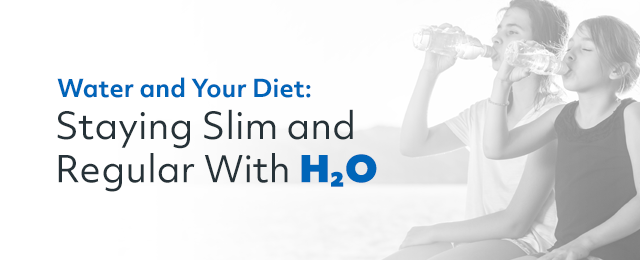
Each day, you lose water through your breath, urine, bowel movements, and perspiration. You must replenish your body's water supply for it to function correctly by consuming foods and drinks containing water. Water is more than an essential component of your diet — it can help you stay slim and regular.
Staying Slim
A study involving 9,500 people shows there could be a link between
staying slim and staying hydrated. Researchers found drinking enough water could be the chief factor in maintaining a healthy weight.
In the study, the participants who were less hydrated were more likely to have higher body mass indexes (BMIs). Researchers found that individuals who haven't hydrated adequately had a higher BMI on average than the individuals who were hydrated. Inadequately hydrated individuals were also almost 60 percent more likely to be struggling with obesity than those who have hydrated adequately.
Staying Regular
Another study involving 3,835 females found a link between low consumption of water and
increased likelihood of constipation.
After reading our guide, you’ll learn:
- How much water you should be drinking.
- Factors that can influence your fluid intake.
- How water positively impacts your weight.
- The positive digestive effects of drinking water.
- Other positive health benefits of drinking water.
- The importance of drinking clean, non-contaminated water.
How Much Water Should I Be Drinking?
It's essential you
drink enough water each day, not only to stay slim and maintain regularity but also for your overall health. Most healthy individuals remain hydrated by drinking fluids like water when they feel thirsty. For some individuals, fewer than eight glasses of water daily could be enough. Others may require more.
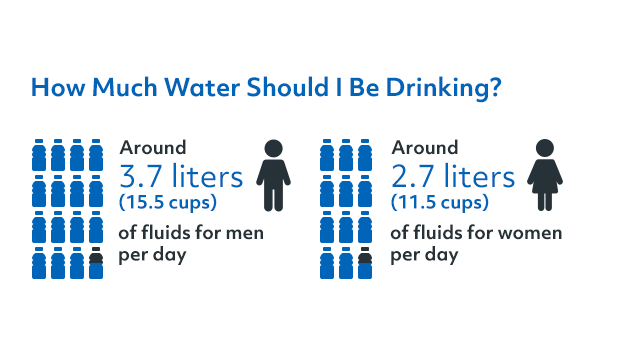
How much water does the average, healthy adult who lives in a temperate climate require? According to the National Academies of Sciences, Engineering, and Medicine,
adequate daily water intake is:
- Around 3.7 liters (15.5 cups) of fluids for men per day
- Around 2.7 liters (11.5 cups) of fluids for women per day
These estimates aren't just for water. They cover fluids consisting of water, other drinks, and food. Around
20 percent of daily fluid intake typically comes from food with the rest coming from beverages.
When you lose more water than you're drinking, dehydration occurs. When your body isn't getting enough water, it can't properly function. Anyone can suffer from dehydration ranging from mild to severe.
Dehydration can cause:
- Nausea or vomiting
- Lightheaded feeling or dizziness
- Lack of sweating
- Muscle cramps
- Fast, hard heartbeat
- Dry mouth
Severe dehydration can lead to weakness, mental confusion, and loss of consciousness. If you're experiencing any of these symptoms, you need immediate medical attention.
When you're dehydrated, and your body can't cool itself properly while exercising in humid or hot weather, it can lead to heat illness. The three stages of heat illness are:
1. Heat Cramping
Heat cramping symptoms include muscle spasms in your stomach, legs, back, or arms. Symptoms of heat cramping include:
- Thirst
- Dehydration
- Transient muscle cramps
- Fatigue
- Sweating
- Involuntary, painful muscle spasms
2. Heat Exhaustion
Your body is overheating when you are in the heat exhaustion stage. Heat exhaustion symptoms are more severe and can include:
- Nausea
- Weakness
- Fast heartbeat
- Headache
- Low blood pressure
3. Heat Stroke
Heat stroke is the most serious with symptoms including:
- A higher than 104 (F) degrees body temperature
- Fast breathing
- Flushed skin
- Fast heartbeat
- Loss of consciousness
- Delirium
- Seizures
If you experience any of these heat stroke symptoms, seek immediate medical attention. If heat stroke is left untreated, it could lead to death.
Factors Influencing Your Fluid Intake
Although the importance of drinking water is very clear, every individual's needs are different, and how much water you'll require will depend on various factors, including:
- How active you are
- Where you live
- Your overall health status
- Whether you’re breastfeeding or pregnant
No certain amount fits everyone. Knowing more about your body's particular need for water will help you determine the amount of water you should be drinking daily.
- Exercise: If you're exercising or performing any other activity that causes you to sweat, you need to cover the loss of fluid by drinking extra water. Be sure to drink water before you work out, as well as during and after. If your exercise session is intense and lasts over an hour, you can replace lost electrolytes by drinking a sports drink.
- Environment: Humid or hot weather can cause you to sweat, requiring extra fluid intake. You can also experience dehydration at high altitudes.
- Overall health: Your body experiences fluid loss when you have diarrhea, fever, or vomiting. Replenish this fluid loss by drinking more water or follow a doctor's recommendation of drinking oral rehydration solutions. Urinary tract stones, bladder infections, and other conditions may increase your need for fluid intake.
- Breastfeeding or pregnancy: Pregnant women or those breastfeeding require extra fluids to maintain hydration. A pregnant woman should drink about 2.4 liters (10 cups) of water or other fluid extra per day. Women who are breastfeeding require around 3.1 liters (13 cups) extra per day.
How Water Positively Impacts Your Weight
Staying hydrated is essential to
manage weight and improve overall health. Hydration is also crucial for other factors such as muscle function and digestion.
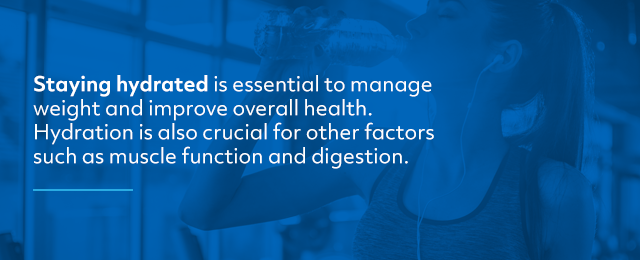
Those looking to improve their diet and cut calories may want to consider drinking more water. University of Illinois Urbana-Champaign researchers found that adults who increased their intake of water by just
one percent simultaneously reduced their consumption of:
- Salt
- Cholesterol
- Sugar
- Saturated fat
Plain water's impact on the diet was similar across education, ethnicity/race, body weight, and income level status, according to the study's leader.
Here are some more reasons to make sure you're drinking enough water or other fluids every day:
1. Water Can Help Burn Fat
Your body can't metabolize carbohydrates or stored fat properly without water. Lipolysis refers to this fat metabolizing process. Hydrolysis is the initial step of this process. This happens when there's an interaction between water molecules and fats called triglycerides to create fatty acids and glycerol. Drinking an adequate amount of water is important for burning stored fat and fat from food and beverages.
A small 2016 review found an increase in water intake increased
lipolysis and fat loss in animal studies.
2. Water Can Naturally Suppress the Appetite
When your stomach senses fullness, it sends messages to your brain to stop eating. Drinking water can help fill up some of the space in your stomach, reducing hunger, and create a feeling of fullness. You might also think you're hungry when you're actually just thirsty. Drinking water before you reach for something to eat can help you reduce or stop unnecessary snacking.
In a study in 2014,
50 females who were overweight drank 500 milliliters of water a half hour before they ate breakfast, lunch, and dinner, along with their normal water consumption, for eight weeks.
These women experienced reduced body fat, body weight, and body mass index. They also reported appetite suppression.
3. Water Can Help Eliminate Body Waste
When dehydrated, the body can't properly remove waste. Drinking water helps your kidneys to filter waste and toxins while it retains essential electrolytes and nutrients. Your kidneys retain fluid when your body is dehydrated. Prolonged dehydration can additionally crystallize minerals and salts in your urine, potentially leading to painful kidney stone formation.
4. Water Can Help Burn Calories
Some studies show drinking water helps burn calories.
Twelve individuals, in a 2014 study, drank 500 milliliters of room temperature and cold water. They reported an increase in energy expenditure. In the 90 minutes after they drank the water, they burned between two and three percent more calories than normal.
The Positive Digestive Effects of Water
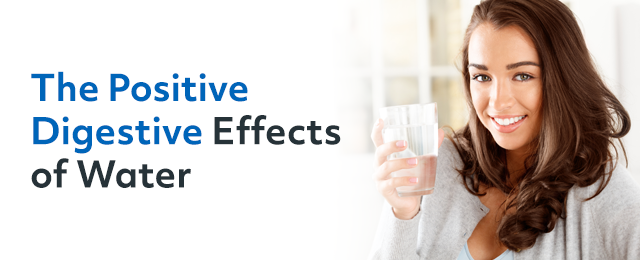
Water plays an essential role in digestion. Saliva is the starting point of digestion — and saliva contains water. It provides lubrication for chewing, swallowing, and aiding digestion. Your body relies on enzymes found in saliva during the digestion process to help break food and liquid down and dissolve nutrients and minerals.
Your colon extracts water from your stool to help move the digestive system along. This can quickly lead to constipation.
The overall positive digestive effects of water include it:
- Promotes nutrient absorption: Water helps break your food down so your body may absorb the nutrients. Good digestion makes nutrients and minerals more accessible to your body. Water intake during or after you eat can help with digestion. If you drink water immediately before you eat a meal, it helps improve your food digestion by preparing your gastrointestinal tract for your meal and improves gastric secretions for an adequate nutrient breakdown.
- Softens stools: Being dehydrated can lead to lumpy, hard stools, and constipation. Water helps move waste by loosening or softening hardened stools, helping to prevent constipation. Water also helps you digest soluble fiber, helping your bowel make soft, well-formed stools which are easy to pass.
- Helps your body recover from digestive issues: When you have diarrhea, you lose water with each bowel movement. You need to increase your fluid intake to replenish lost water.
It's not mandatory for you to drink water to digest your food — but it is helpful. Your body can break your food down better when you drink water. It helps with food digestion by flushing waste from your intestines, helping to relieve constipation. To support the digestion process, along with drinking more water, you should increase the number of fruits and vegetables you consume and cut back on fatty foods.
Since your body loses water through sweating, digestion, and breathing, it's essential you rehydrate not only by drinking water or other fluids but also eating foods containing water.
Other Positive Health Benefits of Drinking Water
Not only is drinking water good for weight loss, staying regular, and digestion but there are other health benefits of water as well, including:
- Supports strong teeth: When you drink water throughout the day, you're also helping to keep your teeth strong. If after a meal, you can't brush your teeth, rinse out your mouth with water to remove some of the bacteria and acid that can damage your teeth. Some bottled waters and tap water contain added fluoride — some health professionals advocate this to help strengthen your teeth and protect its enamel.
- Maximizes physical activity: Physical performance can suffer if you don't stay hydrated. Staying hydrated is especially important when you're in high heat or performing intense exercise. Dehydration could have a noticeable impact if you lose even two percent of the water content of your body. It's not uncommon for athletes to lose up to six to 10 percent of their water weight through sweating. This may reduce motivation, alter body temperature control, make exercising seem harder, and increase fatigue.
- Lubricates your joints: Cartilage, found in the disks of your spine and your joints, contains approximately 80 percent water. Being dehydrated long-term can decrease the shock-absorbing ability of your joints and lead to joint pain.
- Cushions the spinal cord, brain, and sensitive tissues: Being dehydrated can affect your brain's function and structure. It's also involved in hormone production and neurotransmitters. Prolonged dehydration can result in issues with reasoning and thinking.
- Regulates body temperature: Water stored in your middle skin layers comes to the surface of your skin as sweat when your body starts heating up. It cools your body as it evaporates. When there's not enough water in your body, heat storage can increase, and you can't tolerate heat strain as well, according to some scientists. Having enough water can help decrease physical strain while exercising if heat stress occurs.
- Reduces headaches: If you're suffering from migraines, a lack of fluids could trigger an episode easily. If you don't get enough fluids, headaches are more likely to last longer. Also, it can impact how you concentrate, leave you feeling anxious and moody, and cause short-term memory problems.
- Helps deliver oxygen to your body: Your blood is comprised of about 90 percent water, and your blood is the vehicle that delivers oxygen throughout your body, including your tissues, muscles, and organs.
The Importance of Drinking Clean, Non-Contaminated Water
Your drinking water should be free of chemicals, toxins and pathogens, and appear clear — not cloudy. Chemicals, toxins and disease-causing germs can make their way to water supplies, polluting or contaminating the water you drink or come in contact with. This can cause you to become sick.
Contaminated water can cause a myriad of
health problems including:
- Gastrointestinal illnesses
- Neurological problems
- Reproductive issues
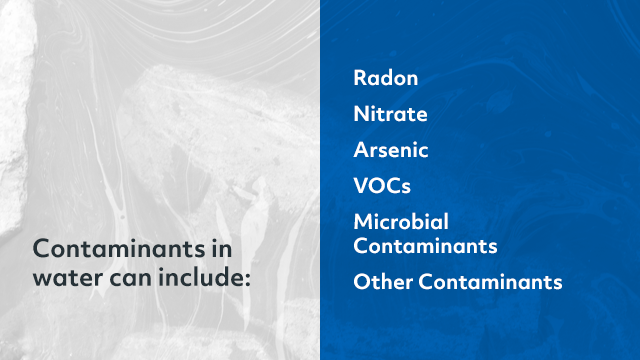
Contaminants in water can include:
- Lead
- Disinfection by-products
- Radon
- Nitrate
- Arsenic
- Volatile Organic Compounds (VOCs)
- Microbial contaminants
- Other contaminants
While the water leaving a treatment plant and making its way to your home must meet very strict safety standards, this doesn't mean the water you drink will be free of all germs and contaminants. It merely means there is a low statistical probability that contaminant levels won't pose any serious risks to your health.
Reduce Contaminants With Multipure Filtration
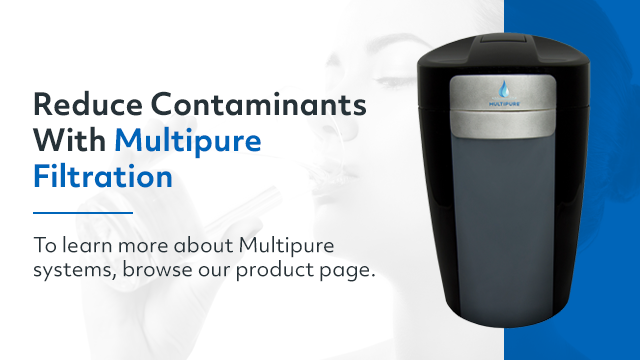
A superb way to remove contaminants in water is to use a
whole house or drinking water solution from Multipure. It provides filtration for your drinking and cooking water, and also water throughout your home.
Not only can you
use Multipure systems inside your home, but also in your yard or on-the-go. By incorporating Multipure’s industry-leading solid carbon block filters into your life, you can reduce contaminants that affect the appearance, taste, and quality of your drinking water.
Multipure systems include products such as drinking water sink systems, in the bath and shower, at point-of-entry, RV sink and hotel filters. There are even products for your garden or yard. To learn more about Multipure systems,
browse our product page.

